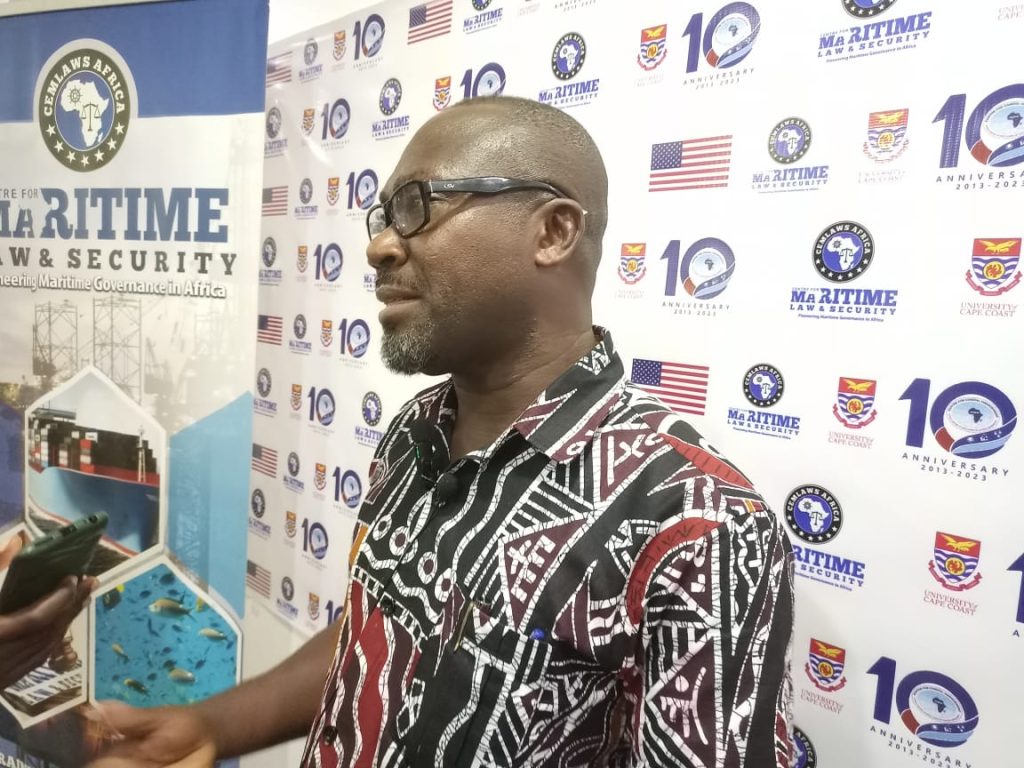By Edward Acquah
Accra, April 28, GNA – The Centre for Maritime Law and Security (CEMLAWS) has expressed concern over the proliferation of foreign-owned industrial fishing vessels on Ghana’s territorial waters, contrary to regulations governing the fisheries sector.
The CEMLAWS said although it was illegal for foreign-owned vessels to fish in Ghana, many fishing vessels flying the Ghana flag were owned by foreigners, with some Ghanaians acting as fronts for benefits.
The Organisation said the situation which has fuelled illegal practices on Ghana’s waters, threatened food security and the livelihoods of thousands of artisanal fishers who depend on the sector.
The issues emerged at a workshop for media practitioners on distant water fishing vessels in Accra on Thursday.
The training formed part of a project titled: “Promoting Local Capacity to Address the Destabilizing Impacts of Foreign Fishing Vessels in the Gulf of Guinea and Mauritania.”
The Project, coordinated by CEMLAWS Africa and the Centre for Coastal Management (CCM), University of Cape Coast, is funded by the Department of State, U.S. Embassy in Accra.
The Fisheries Act 625, 2002 prohibits foreigners from operating industrial vessels or trawlers in Ghana.
Section 47 of Act 625 says an industrial or semi-industrial fishing vessel must be owned or controlled by a citizen of Ghana, the government, or owned or controlled by a company or partnership registered by law in Ghana.
According to the Ghana Fisheries Management Plan (2022-2026), currently, there are about 76 active industrial vessels in Ghana, which contributed to an estimated annual catch of 37,507 metric tonnes in 2019.
It is estimated that one needs not less than US$10 million as minimum capital to register and operate trawlers in Ghana.
Dr Kamal-Deen Ali, the Executive Director of CEMLAWS Africa, said one of the key challenges confronting the fisheries sector was the lack of information to inform decision-making and enhance transparency.
He said larger beneficial ownership of vessels in the industrial and tuna sectors rests with foreigners and stated that the country must ensure its resources were protected in all arrangements.
“Vessels must fish in a way that is sustainable and takes into consideration the rights of others particularly those in the artisanal sector.
“We depend heavily on fish as a country so we cannot take the industry for granted; we must make sure that it is a resource that is protected,” Dr Kamal-Deen said.
He expressed the hope that the training would enhance journalists’ knowledge about the fisheries sector to raise questions, interrogate issues and promote accountability.

Professor Dennis W. Aheto, the Director of the Centre for Coastal Management, said the lack of resources and finance undermined the ability of local people to own and operate industrial vessels.
He appealed to the Government and the private sector to resource local fishers to scale up their operations and exercise control in the industrial sector.
“The law is very good but how are we providing the support system for the private sector and the Government to support those already in the industry?
“Otherwise, the state’s resources will be in the hands of foreigners,” he said.
GNA